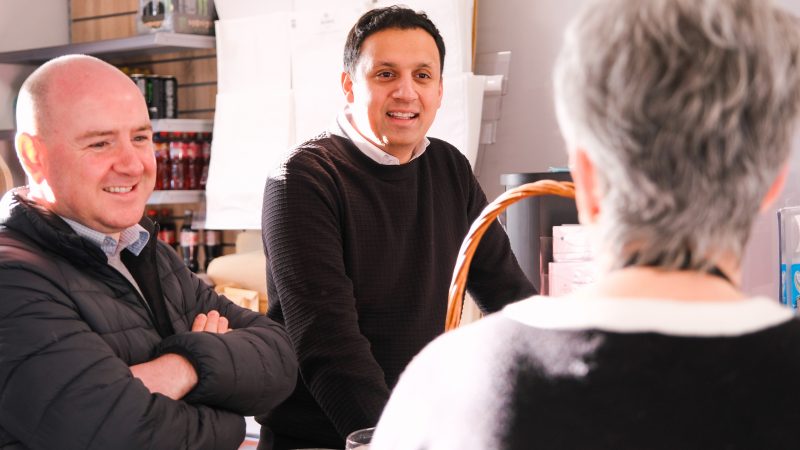
For the first time in almost a decade, an election in Scotland looks competitive. Scottish Labour has finally won the breakthrough they have craved for almost a decade. The Tories have basically given up and the SNP are having a complete crisis in confidence. But Scottish Labour cannot let their lead in the polls lull them into a false sense of security. There are eight seats in Scotland that are too close to call, but voter apathy is the main opponent activists are encountering on the doors.
Labour’s polling in Scotland is promising
The latest Ipsos Mori MRP suggests Scottish Labour being touted to win more than double the seats of the SNP at next month’s election (Scottish Labour: 34 vs SNP: 15). There is certainly a tantalizing taste of victory in the air. But like the Tartan Army, who marched into Germany with their unique brand of support, Scottish Labour must be careful to ensure they avoid hubris going into the final fortnight of the campaign. There are still many undecided voters.
Scottish Labour looked to be consigned to the history books just two years ago. The difference Anas Sarwar has made to the party’s fortunes cannot be underestimated. On the face of it, Scottish Labour are running a buoyant campaign with carefully orchestrated campaign events almost every day and wall-to-wall media coverage that shows a party back on top.
But out on the doorstep, grassroots activists are faced with one pervasive issue opinion polls cannot measure: apathy. There appears to be an overwhelming lack of enthusiasm for any of the political parties among the general public, and people would far rather be watching the Euros than engaging with the political process.
SNP’s fall from grace was inevitable
The SNP’s fall from grace was inevitable. What goes up, must come down. Who in Scotland could forget the scenes of the police tent in the garden of Nicola Sturgeon and her husband, former SNP chief executive Peter Murrell as they searched the home in connection with allegations of misusing £600,000 funds earmarked for an independence campaign?
What amazes many who have never been enamoured by the SNP was why it took so long for the party’s fall. Before the allegations of financial irregularities plagued the SNP, the party’s former leader and First Minister Alex Salmond went through a high profile High Court trial accused of sexually assaulting several women. This had little impact on the SNP’s polling.
Scottish politics feels competitive again
Where there may be some reflection in the opinion polls is the collapse in the SNP and Tory vote in Scotland. Overwhelmingly, the answer to the question asked by keen Labour canvassers “Is there a party you definitely won’t vote for” is either the SNP or the Tories.
For the first time in almost a decade, Scottish politics feels competitive again. Since the yellow tsunami swept 56 SNP MPs to Westminster in 2015, there has been a defeatist attitude from Scottish Labour and the Scottish Conservatives. At the last two Scottish Parliament elections, both parties ran campaigns to come in second because it was simply expected that the SNP would win.
Parties are now fighting for every vote. All resources are being targeted towards Labour’s battleground seats in Scotland and non-battleground candidates are being urged to ditch their own campaigns to help them over the line.
The SNP and the Tories are unappealing prospects
The SNP campaign has resembled the viral Willy Wonka Experience in Glasgow earlier this year, with its sad pop up banners and posters looking like a political campaign bought from Temu. The Scottish Tory leader Douglas Ross decided to resign midway through the election campaign after he renegged on a promise that he’s stand down from Westminster, usurping the seriously ill David Duguid in the process.
It almost feels like this election has been a gift from the gods for Labour. But it is not the SNP or the Tories which is making the race too close to call. It is voters who have had enough of putting their trust in politicians who do not uphold the standards they would expect from an elected representative. If Scottish Labour continue their positive, upbeat campaign with Anas Sarwar front and centre over the next two weeks, there is little doubt the party could once again dominate Scottish politics as long as they manage to deliver for people in office.
Read more of our 2024 general election coverage:
Labour wants a new generation of new towns. Can it win in Milton Keynes?
2024 manifesto versus 1997: ‘There are big similarities, but big differences’
‘How can I help Labour this election? The party insider’s guide to campaigning’
Revealed: The battlegrounds attracting most activists as 17,000 sign up
SHARE: If you have anything to share that we should be looking into or publishing about this story – or any other topic involving Labour or the election – contact us (strictly anonymously if you wish) at [email protected].
SUBSCRIBE: Sign up to LabourList’s morning email here for the best briefing on everything Labour, every weekday morning.
DONATE: If you value our work, please donate to become one of our supporters here and help sustain and expand our coverage.
PARTNER: If you or your organisation might be interested in partnering with us on sponsored events or content, email [email protected].




More from LabourList
‘Labour won’t stop the far right by changing leaders — only by proving what the left can deliver’
‘Cutting Welsh university funding would be economic vandalism, not reform’
Sadiq Khan signals he will stand for a fourth term as London Mayor